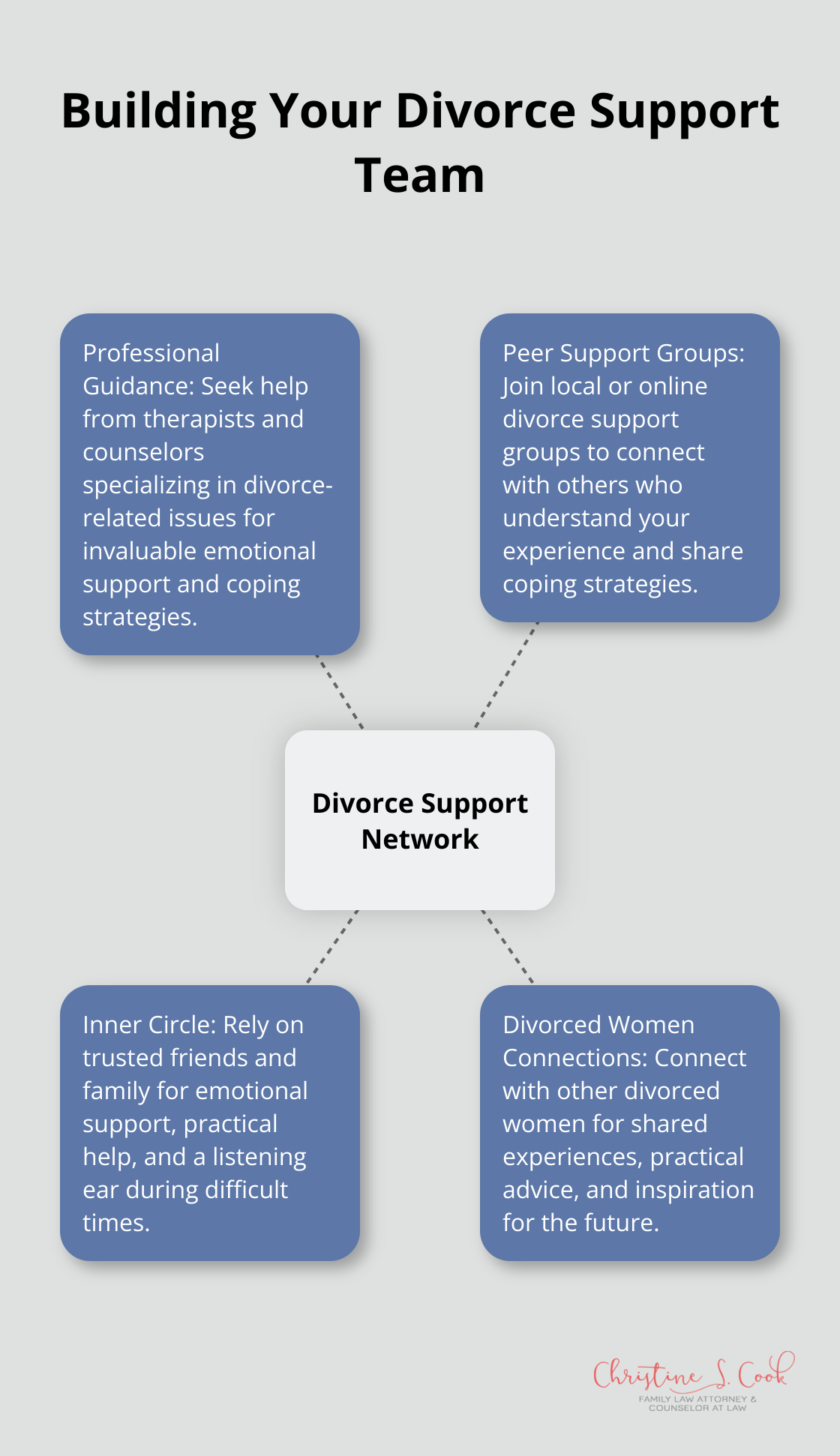Divorce can be an overwhelming experience, especially for women. At Christine Sue Cook, LLC, we understand the unique challenges faced by women going through this difficult process.
Finding support for women going through divorce is crucial for navigating the emotional, legal, and practical aspects of this life-changing event. In this post, we’ll explore effective strategies to build a strong support network and practice self-care during this challenging time.
Divorce triggers a flood of emotions that can leave you feeling lost and overwhelmed. Let’s explore the emotional landscape of divorce and how to navigate it effectively.
Divorce unleashes a torrent of feelings. You might experience anger one moment and profound sadness the next. This emotional rollercoaster is normal. According to a 2020 study, people who go through divorce often report higher levels of stress, anxiety, depression, and social isolation. Recognition of these feelings as part of the process can help you cope better.

Divorce often mirrors the grief process. You may experience denial, anger, bargaining, depression, and acceptance – not necessarily in that order. These stages, first identified by Elisabeth Kübler-Ross, aren’t linear. You might bounce between them or experience multiple stages simultaneously. This understanding can help you be more patient with yourself during the healing process.
While emotional turmoil is expected, it’s important to identify when your mental health needs extra attention. Watch for these warning signs:
If you experience these symptoms for more than two weeks, seek professional help. The National Institute of Mental Health reports that early intervention can significantly improve outcomes for those experiencing depression or anxiety during divorce.
Create an emotional first aid kit to help you through tough moments. This could include:
It’s okay to not be okay. The key is to acknowledge your emotions and seek support when needed.
View your emotional journey as a path to personal growth. Many women report feeling stronger and more self-aware after navigating the challenges of divorce. Recent research suggests that ending bad marriages can dramatically improve women’s mental and even physical health.
As you move through this emotional landscape, keep in mind that healing takes time. Be patient with yourself and don’t hesitate to lean on your support network. In the next section, we’ll explore how to build and strengthen that support system during your divorce journey.
Professional help is a sign of strength, not weakness. A therapist or counselor who specializes in divorce can provide invaluable support. Discernment counseling is designed to help couples considering divorce arrive at a greater sense of clarity and confidence in their decision making. Look for professionals with experience in divorce-related issues. Many offer sliding scale fees or online sessions for accessibility.
Divorce support groups offer a unique opportunity to connect with others who understand your experience. Local community centers, churches, and online platforms often host divorce support groups. Virtual options have become increasingly popular, allowing for flexibility and wider access. When you choose a group, consider factors like group size, frequency of meetings, and whether a professional facilitator leads it.
Your existing network of friends and family can be a powerful source of support. However, it’s important to be selective. Choose confidants who listen well and don’t judge. Be clear about what kind of support you need – whether it’s emotional support, help with childcare, or just a distraction.
Don’t hesitate to reach out, even if you feel like you’re burdening others. True friends want to help.
Sharing experiences with other divorced women can empower you. These connections offer practical advice, emotional support, and hope for the future. Look for local meetups specifically for divorced women or join online communities. Websites provide forums where you can connect with others in similar situations.
Building a support network takes time and effort. Try different avenues of support until you find the right combination of professional help, peer support, and personal connections. This mix can make a world of difference in your divorce journey.

As you build your support team, it’s equally important to focus on self-care. In the next section, we’ll explore strategies to prioritize your well-being during this challenging time.
Physical health forms the bedrock of emotional resilience. Regular exercise reduces stress and improves mood. Try to engage in 30 minutes of moderate activity daily (a brisk walk, yoga, or dancing to your favorite tunes).
Nutrition plays a key role too. The British Journal of Nutrition highlights that a diet rich in fruits, vegetables, and omega-3 fatty acids can combat depression. Stock your kitchen with nutrient-dense foods and consider meal prepping to ensure you eat well, even on tough days.

Mindfulness and stress-reduction techniques serve as powerful tools in your self-care arsenal. Mindfulness meditation can reduce anxiety and depression symptoms.
When you feel overwhelmed, use the 5-4-3-2-1 grounding technique. Name 5 things you see, 4 things you touch, 3 things you hear, 2 things you smell, and 1 thing you taste. This simple exercise can anchor you in the present moment.
Exploring new hobbies or interests isn’t just a distraction-it’s a way to rediscover yourself. The Journal of Positive Psychology found that creative activities increase well-being and personal growth.
Take a cooking class, learn a new language, or try painting. Local community centers often offer affordable classes. If time is tight, online platforms like Skillshare or Coursera provide flexible learning options.
Setting boundaries protects your energy and time during divorce, allowing you to focus on healing and growth. Start small by declining non-essential commitments. Practice phrases like “I appreciate the offer, but I’m not able to take that on right now.”
Self-care isn’t selfish-it’s necessary. Prioritize your well-being to handle the challenges of divorce and emerge stronger on the other side.
Divorce challenges women in unique ways, but you don’t have to face it alone. Professional counseling, support groups, and trusted friends offer valuable support for women going through divorce. These resources help you navigate the complexities and emerge stronger. Our team at Christine Sue Cook, LLC provides compassionate legal support to guide you through this difficult time.
You possess the strength to overcome this challenge and create a fulfilling future. Each step you take, from joining a support group to practicing self-care, moves you towards a brighter tomorrow. Healing takes time, so be patient with yourself and celebrate small victories along the way.
We invite you to explore our services and schedule a free consultation. Divorce marks a new chapter in your story, not the end. With the right support and resources, you can embrace the next phase of your life on your own terms (and create a future filled with possibilities).
